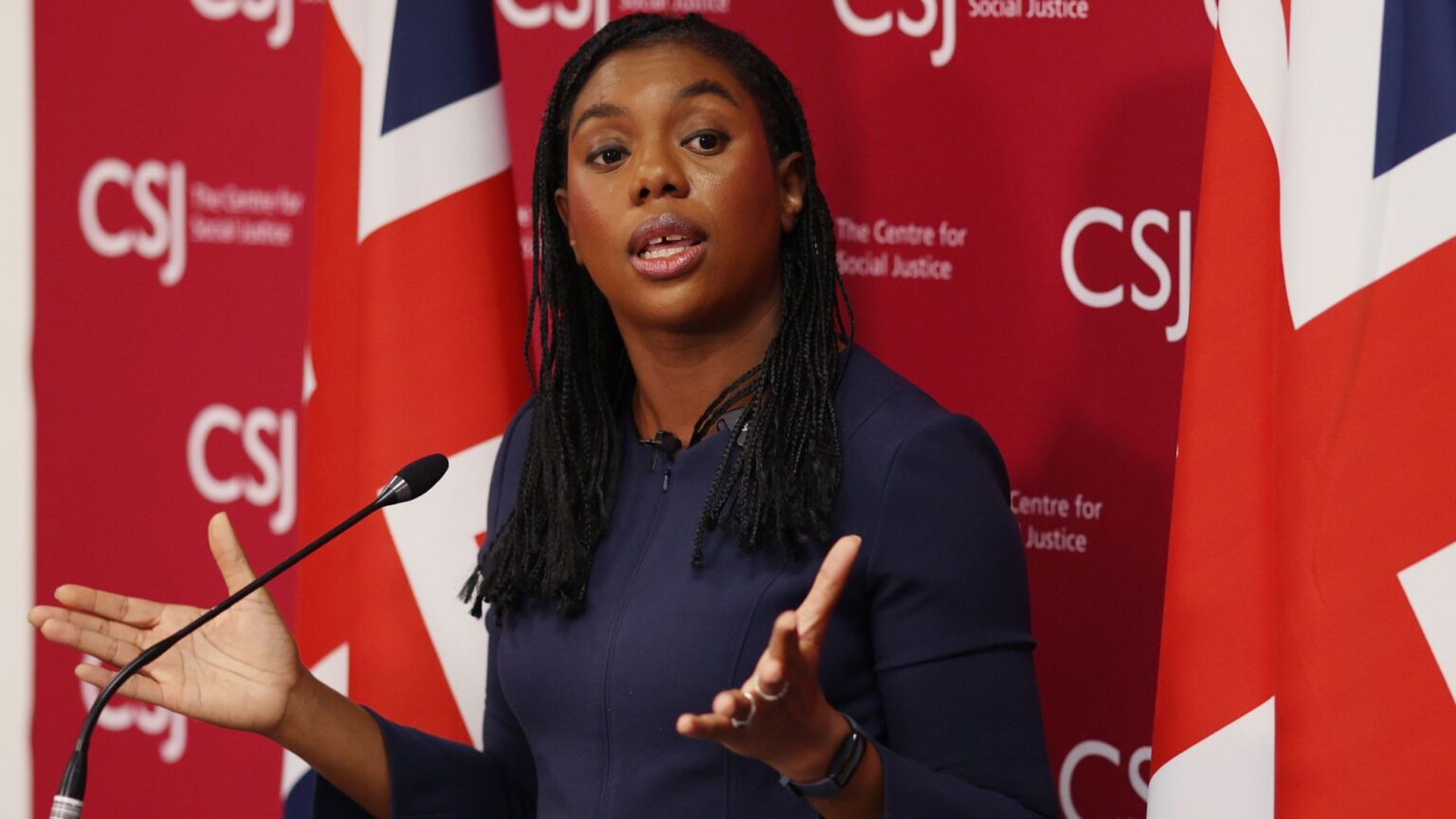The phoney climate consensus is breaking apart
Kemi Badenoch’s call to ‘drill, baby drill’ is a long-overdue blow to Net Zero penury.

Want unlimited, ad-free access? Become a spiked supporter.
Kemi Badenoch has just broken one of the great taboos of modern British politics. Ahead of a speech in Aberdeen tomorrow, the Tory leader has pledged to allow every last molecule of oil and gas to be extracted from the North Sea. This is a long-overdue recognition of the folly of Net Zero.
Badenoch’s intervention not only draws a clear dividing line with the Labour government, whose energy secretary, Ed Miliband, has banned new North Sea oil and gas exploration. It is also a repudiation of Conservative policy of the recent past – it was Theresa May, after all, who signed Net Zero into law back in 2019. Until recently, Badenoch was only prepared to say that decarbonising Britain by 2050 would be too costly, and that the deadline would need to be extended. Her call to reverse course on oil and gas marks an even sharper break with the last government, bringing her party’s position into line with Reform UK, which has long advocated abandoning Net Zero.
This is undoubtedly a historic shift. Only a few years ago there was a cast-iron, cross-party consensus on climate change that had held for decades. A ‘consensus’ that had been sustained over the heads of the electorate, even as its dire economic consequences have piled up. Yet now, Britain’s two main parties of the right are saying ‘no more’.
Labour’s ban on North Sea exploration speaks to the absurdity of Net Zero. As Badenoch points out, the UK is prevented from exploiting its domestic resources, but is instead importing fossil fuels from Norway – despite the UK sharing the same seabed. Tapping the North Sea’s resources could provide enough oil and gas to meet half of the UK’s fossil-fuel demand and would sustain an industry that employs around 200,000 people. Squandering this resource, Badenoch rightly says, is a form of ‘unilateral economic disarmament’.
More broadly, the drive to Net Zero is responsible for Britain’s exorbitant energy costs. The premature closure of gas and coal power plants, combined with the headlong rush to embrace unreliable renewables, has saddled the UK with the highest industrial energy costs in the developed world. The result is that heavy industries – from carmaking and chemicals to mining and steel – are struggling to compete and are shutting up shop. Opening up the North Sea may not compensate for these losses on its own, but it signals a welcome change in priorities from the Tories: from carbon reduction at all costs to economic growth and energy security.
Until recently, the ‘mainstream’ parties closed ranks to protect the climate consensus. We saw this in the run-up to New Labour’s Climate Change Act 2008, which set legally binding decarbonisation targets. Initially, David Miliband, the environment secretary charged with drawing up the legislation, proposed reducing carbon emissions by 60 per cent. Yet rather than contesting this act of economic self-sabotage, the other parties competed to set ever more stringent targets, with the Tories urging cuts of 80 per cent and the Lib Dems calling for 100 per cent (and for a ban on carbon-neutral nuclear power, for good measure). Then, in 2015, the same three main parties signed a pledge not to contest the advice of the unelected Climate Change Committee (CCC). In 2019, Net Zero became law, under the Tories, after just 90 minutes of parliamentary debate and without even a vote.
Democracy has consistently been sidelined on the path to Net Zero. Technocrats and green NGOs claim the false authority of ‘the science’ to push through their preferred policies with minimal scrutiny (the Climate Change Act itself was written by Friends of the Earth’s Bryony Worthington). These were then goldplated by international treaties, such as the Paris Agreement. Apocalyptic warnings of a ‘climate emergency’ keep dissent and debate to a minimum.
Of course, the UK’s climate consensus was always phoney, shared only among the establishment. There was never any public clamour for carbon targets or any debate about the trade-offs. A 2018 report by the Green Alliance, an environmental think-tank, found that 10 years after the Climate Change Act came into force, ‘For the overwhelming majority of people, climate change [remains] a non-issue’. One anonymous MP quoted in the report despaired that he had ‘knocked on hundreds, literally thousands of doors, and had tens of thousands of conversations with voters’, and yet, ‘I just don’t have conversations about climate change’.
The Green Alliance urged politicians to engage with the public on green issues, in the hope of building a ‘mandate’ for aggressive climate action. Yet in the years since, people have started to make their voices heard – just not in the way the establishment had hoped. In the UK, green policies from London’s Ultra-Low Emissions Zones to traffic-calming measures in towns across the country have spurred huge local opposition. And the climate-sceptical Reform UK now tops the Westminster polls. Across Europe, in fact, climate measures from green taxes to farming regulations are spurring mass protests and accelerating the rise of populist parties.
No doubt this growing public scepticism is what has fuelled Kemi Badenoch’s plans to ‘drill, baby, drill’. The burden of Net Zero is now impossible to ignore. Households and industries have reached breaking point. A deep well of anger has effectively forced Badenoch’s hand. Sticking with a policy that demands ever more sacrifices from the public was always unsustainable.
For years, voters were treated as mere bystanders while stringent Net Zero policies were agreed on above their heads. That is now over. The revolt against the climate consensus is just getting started.
Fraser Myers is deputy editor at spiked and host of the spiked podcast. Follow him on X: @FraserMyers.
£1 a month for 3 months
You’ve hit your monthly free article limit.
Support spiked and get unlimited access.
Support spiked – £1 a month for 3 months
spiked is funded by readers like you. Only 0.1% of regular readers currently support us. If just 1% did, we could grow our team and step up the fight for free speech and democracy.
Become a spiked supporter and enjoy unlimited, ad-free access, bonus content and exclusive events – while helping to keep independent journalism alive.
———————————————————————————————————————————–
Exclusive January offer: join today for £1 a month for 3 months. Then £5 a month, cancel anytime.
———————————————————————————————————————————–
Monthly support makes the biggest difference. Thank you.











Comments
Want to join the conversation?
Only spiked supporters and patrons, who donate regularly to us, can comment on our articles.